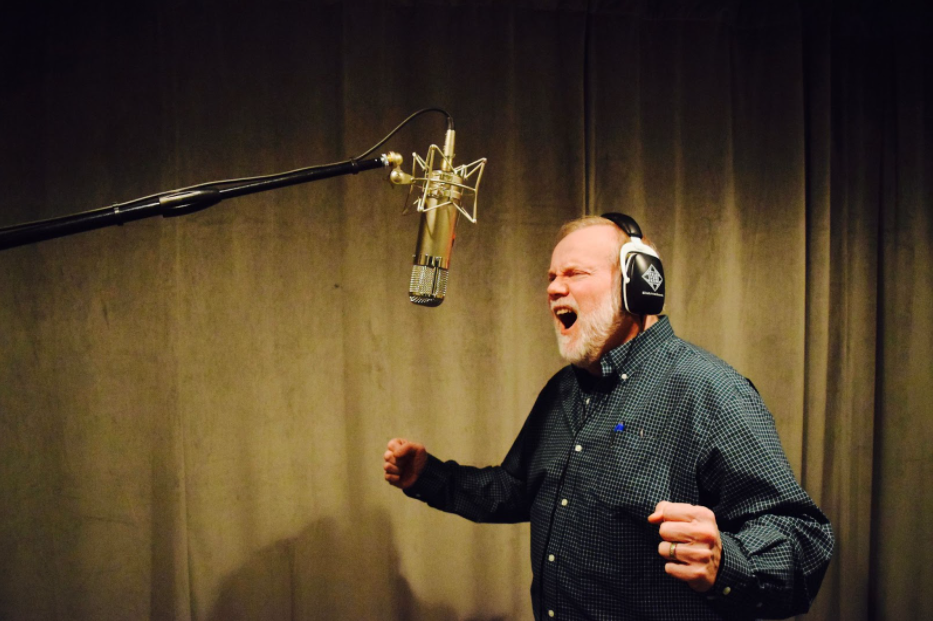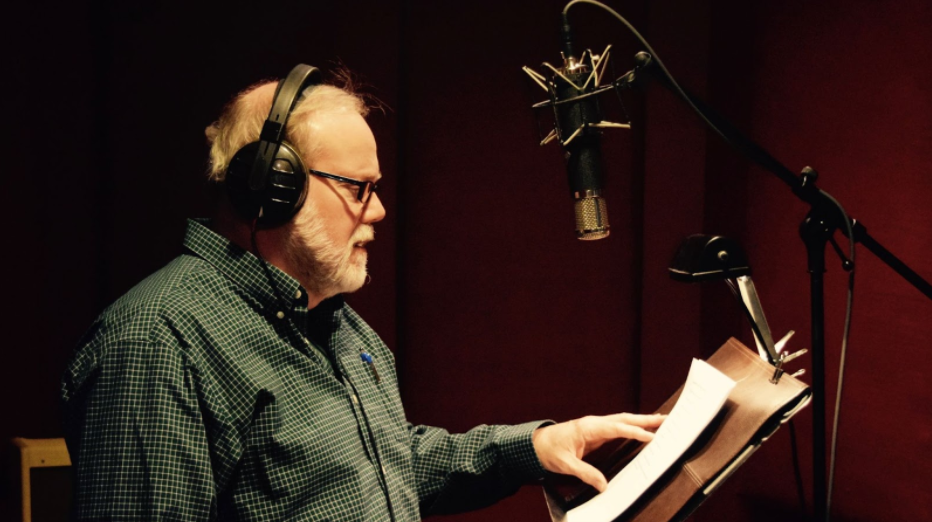When you think of how video games are made, you probably picture the people sat behind desks, typing out lines of code. Maybe those who do all the graphical stuff to make games look pretty too. But there is an integral part of the team often overlooked by people when they talk about game development, and that is voice actors such as George Ledoux.
These are the people who help to bring our favourite characters to life. Their trained voices give characters personality and help tug on our heartstrings in the way they tell the tales. They add an extra dimension to games that without, would be seriously missed because audio immersion into video games is just a key component as the visual aspects for many, and we don’t even realise it. Just imagine watching Jaws without the famous “duh-duh” sound, it wouldn’t be the same.
And we’ve been fortunate enough to chat with George Ledoux, and learn a little more about himself, and voice acting in general. As well as getting his thoughts on some of the latest games he has been working on. So let’s see what he had to say when we put our questions to him…
To get the ball rolling, please tell us a little bit about who you are and what you do.
My name is George Ledoux and I’m a freelance voice actor, voice casting, and voice director for games. I’ve been a voice actor since 1995 or so and have done every genre of voice over with the exception of live-action dubbing.
How did you get into voice acting?
I was always interested in voice acting even as a kid before I knew it was a thing. Cartoons, old-time radio shows I listened to on records (and over the radio!) and comedy albums. Skipping ahead to the early 1990s, a friend at work told me that I should do it as a living after hearing a homemade radio-play comedy I had recorded parodying my workplace and bosses for a Christmas thing. He was also a part-time professional award-winning writer and journalist, Stanley Wiater. He bought me a book called, “Take It From The Top” by Alice Whitfield, which opened my eyes to the possibilities of a career in voiceovers.
Besides not being on a camera, how else does voice acting differ from physical acting?
I feel a much greater feeling of intimacy between characters or between a character and the listener/game player can be achieved. You can get near the microphone and pretend that you’re speaking to a close friend or lover without the potential for physical awkwardness that would happen between live actors in the same space.
Also, a voice actor is not limited by their physical appearance. Casting choices can be made which consider a much wider diversity of potential actors. This is an area that has been gaining strength but has much farther to go in the wide field of entertainment, not just in voice acting.
Is there anything that you find easier or more difficult to do when voice acting?
The fact that you are not physically in the same room or even working with the other actors or characters at the same time is oftentimes a huge challenge for stage actors to overcome. Especially in game scripts, you often have to rely on the director and your own imagination to envision the environment and situations that your character is in.
That, and fighting or death scenes. These are often called ‘efforts’ and can be extremely difficult to perform without damaging your vocal cords. These recording sessions can often run for a few hours and without the proper training, you can really cause a LOT of damage to your voice.

Now the main reason we’re chatting with you today is that you’ve voice acted in a number of video games. So we’d like to ask you a few questions about this. Firstly, does working on video games differ at all from other forms of entertainment?
Sure, this goes back to the last question where I explained the difficulty in working by yourself, whether at home in your own studio or even in a professional studio with a director, producer and audio engineer. You’re often given a script that you’ve never seen until the last minute (due to super-sekrit NDA policies) and you need to be able to fully involve yourself in the scene and imagine all the other characters and actors around you. The director or narrative designer can help by describing everything, but it’s still up to you to bring it to life.
A recent episode of Mythic Quest: Raven’s Banquet on AppleTV sees one of the show’s characters flashing back to their youth and saying one day they’ll be writing stories for video games. Were you similar in that you had a long-standing fascination with video games wanting to voice act in them, or do you just see them as another form of media to work in?
I’m a bit too old to say I imagined working in video games as a child since I was born in 1961. In fact, the only thoughts of voice acting at the time would’ve been radio and TV commercials and cartoons. However, because I had access to old radio show recordings on records like The Shadow and Lights Out, and loved certain comedy groups like the Firesign Theatre and Monty Python who also released material on records, that was something I always wished I could do as a kid.
Once video games became an actual thing, I was already doing VO, but still didn’t imagine it as a potential voice acting genre for years until I was actually hired for a game.
You’re currently working on a number of different titles, Dying Light and Deadhaus Sonata, tell us a little bit about these games and the roles you play within them.
Regarding the Dying Light games, I have actually worked with Techland Games since 2012 as a voice actor and producer of ‘placeholder audio’ as well as the occasional voice actor for their final products including the occasional game trailer. However, the final audio for their games has always been produced by outside studios and directors and actors in Los Angeles and elsewhere. I was fortunate enough to be asked to play a few roles for the Dying Light games which were made possible by the technology of remote recording.
For the original Dying Light, I played a few roles. The two biggest characters were Karim, who was the main villain’s lieutenant but who also helps guide the player through a few missions. The second character was an older man named Jaffar, who owns an old auto-repair shop. There were also a few smaller characters that were thrown at me last minute during the recording sessions but I don’t remember who they were.
In regards to Deadhaus Sonata being developed by Apocalypse Studios, I am beyond excited and passionate about the company and the game. It’s coming from their CEO Denis Dyack who has a list of game developer credits as long as my arm but who is probably best known for creating the “Legacy of Kain”, “Eternal Darkness” and “Too Human” games, to name a few.
I am officially the “VO Producer”, but I’m also an actor, casting director and voice director. As a voice actor, I’ve played Ngaztak, the Revenant King of the Undead as well as the all-too-human, Grand Inquisitor, Alaric Von Beller. There is so much that is coming from this team and I can’t wait to be able to tell everyone more. But for now, nope.
With the coronavirus pandemic affecting everyone around the world, did you face any new challenges when working on these games?
Personally, with regards to my voice acting career, NO. I was already working remotely from my home studio when the world shut down so the transition was barely noticeable. However, a LOT of actors who were based in the major voice acting hubs such as Hollywood, NYC, Dallas, etc were screwed at first. So many of them had to scramble to build recording booths or gather the necessary equipment to connect and work remotely.

Both games’ themes are kind of dark in nature and focus around the undead, although from different perspectives. Is this a specific genre you enjoy working in?
Ehhhh, to be perfectly honest, I have stress nightmares about zombies so I’m not a big fan. LOL.
BUT, to be able to work on and play an undead character in a dark, gothic, medieval fantasy world is perfect for my Halloween-loving aesthetics. Halloween is my absolute favourite time of year and holiday and Deadhaus Sonata is pretty much a dream job for me.
What other genres would you like to turn your hand to?
I would love to be able to work on English dubbing for anime or any animations. But, in my humble opinion, Anime is extremely difficult to get involved in because:
1) The competition for roles is ridiculously high due to so many voice actors wanting to be involved in it. This also leads to the next problem.
2) You must be willing to work hard for much less money than most other VO genres.
3) It is not absolutely necessary anymore, thanks to remote recording technology and the Pandemic forcing the studios to adapt to remote recording sessions, but it really helps to be located near to the dubbing studios. I am NEVER going to live in Los Angeles or Dallas or NYC. I’m done moving. LOL
If there was one game from the past that you wish you could’ve worked on, what title would it be?
No idea. Mass Effect maybe? Diablo?
Now, one for those looking to become big voice acting stars themselves, what advice can you offer to those who are just getting into voice acting in video games?
Don’t quit your day job. It’s a very difficult road ahead for 99% of beginners. It may be years before you can earn enough to support yourself. Learn how to ACT, not just do funny voices or impressions. It’s voice ACTING. Take lessons in person or online, join improv classes, get involved in the online sites and groups that specialize in helping aspiring voice actors. Get to know other actors. Networking and knowing people will get you far but also, as Wil Wheaton says, ‘don’t be a dick’. Also, check out the website: IWantToBeAVoiceActor.com for great info and advice on where to start.
Basically, everything I should have done but didn’t because none of it was available to me back in the day.
And finally, a quick question for fun, pineapple on pizza? Yes or No? (Be warned there is a correct answer!)
YES. I don’t give AF if anyone else likes it or not. I do and my wife does. I also like peanut butter on pizza. That’s good enough for me.
And there we have it, a small insight into the life of a voice actor in video games. We’d like to thank George Ledoux for his time answering our questions, although he and his wife clearly got that last one wrong. And peanut butter? It only gets worse!
But seriously, it was great to chat with George Ledoux and explore an area of game development that can be quite overlooked at times. If you’d like to learn more about George and what he does, we have a few links below for you to check out. And that’s it from us until our next “Chatting with…“, thanks for reading!
Useful Links to follow George Ledoux
- Official Websites: http://www.georgeledoux.com & http://www.voicesinmyhead.com
- Twitter: https://twitter.com/GLedouxVoiceovr
- Instagram: https://www.instagram.com/george_ledoux_voiceover/
- YouTube: https://www.youtube.com/user/CussinGeorge
Check out more of our interviews by clicking HERE.